Table of Contents
Get started with MyPerfectResume today!
- Build a resume on any device
- Pick an ATS-friendly template
- Tailor with AI copy suggestions
Why this resume works
- Quantifies accomplishments: By pulling actual metrics like boosting reservoir yield by 10% or reducing costs by 15%, the applicant’s resume accomplishments showcase tangible impact and value.
- Highlights industry-specific skills: With skills in seismic data analysis, geological surveying, and environmental assessment, the applicant highlights a strong fit for roles in geoscience and resource management sectors.
- Uses action-oriented language: Action verbs such as “analyzed,” “led,” and “developed” on the resume convey initiative and effectiveness.
More Geologist Resume Examples
Our geologist resume examples show how to showcase your fieldwork expertise, analytical skills, and research experience. Use these science resume samples to create a resume that highlights your strengths and positions you for success in geology roles.
Entry-Level Geologist
Why this resume works
- Effective use of keywords: By weaving in role-specific keywords like “geophysical techniques” and “remote sensing,” the applicant boosts their resume’s chances of passing applicant tracking systems (ATS) filters seamlessly.
- Shows digital literacy: Using platforms for remote sensing and data analysis highlights the applicant’s digital readiness, reflecting strong computer skills essential for today’s tech-savvy workplaces.
- Puts skills at the forefront: The strategic focus on skills such as geological survey techniques immediately catches attention, showcasing a well-crafted skills-based resume format that aligns with industry demands.
Mid-Level Geologist
Why this resume works
- Points to measurable outcomes: Quantifiable achievements like improving mapping accuracy by 30% and reducing project costs by 20% emphasize the applicant’s ability to deliver compelling results through data-driven approaches.
- Demonstrates language abilities: Language skills in Spanish, French, and German highlight adaptability for international collaboration, improving communication across diverse teams and projects.
- Includes a mix of soft and hard skills: Combining technical expertise with leadership in team projects shows a balance of analytical skill and interpersonal skills important for successful geological exploration.
Experienced Geologist
Why this resume works
- Focuses on work history: Using a chronological resume format, the applicant’s extensive work history flows seamlessly, revealing progressive career growth from field geologist to senior roles.
- Showcases impressive accomplishments: Impressive accomplishments like reducing pollution by 30% and managing substantial budgets highlight the applicant’s capacity for high-impact performance and strategic innovation.
- Sections are well-organized: Well-structured sections with clear headers and bullet points ensure the resume is reader-friendly, making it easy to scan through key achievements and expertise areas.
Geologist Resume Template (Text Version)
Aaron Sanders
Los Angeles, CA 90003
(555)555-5555
Aaron.Sanders@example.com
Professional Summary
Experienced geologist with expertise in seismic data analysis and geological surveying. Proven track record of improving project outcomes by 20% via effective data interpretation, enhancing environmental safety and resource management.
Skills
- Geological Surveying
- Seismic Data Analysis
- Geospatial Mapping
- Project Management
- Data Interpretation
- Environmental Assessment
- Fieldwork Expertise
- Technical Reporting
Certifications
- Certified Professional Geologist – American Institute of Professional Geologists
- GIS Certification – GIS Certification Institute
Education
Master of Science Geology
Stanford University Stanford, California
June 2019
Bachelor of Science Earth and Environmental Sciences
University of Colorado Boulder Boulder, Colorado
June 2018
Work History
Geologist
Earth Insights LLC – Los Angeles, CA
January 2024 – August 2025
- Analyzed seismic data, increasing accuracy by 20%
- Led field surveys, reducing project costs by 15%
- Developed geological models for three major sites
Petroleum Geoscientist
Greenfield PetroSolutions – Lakeside, CA
January 2022 – December 2023
- Mapped reservoirs, boosting yield by 10%
- Streamlined data collection, saving 30 hours/month
- Collaborated on exploration projects worth $2M+
Environmental Geoscientist
EcoTrack Services – Lakeside, CA
January 2020 – December 2021
- Assessed soil contamination, enhancing safety by 25%
- Managed resource allocation, cutting waste by 12%
- Presented findings at industry conference of 500+
Languages
- Spanish – Beginner (A1)
- French – Beginner (A1)
- Mandarin – Beginner (A1)
Related Resume Guides
Advice for Writing Your Geologist Resume
Whether you’re just starting out or looking to dig deeper into your career, understanding how to write a resume that highlights your unique skills and experiences can make all the difference. Explore our tips and get ready to rock your job search!
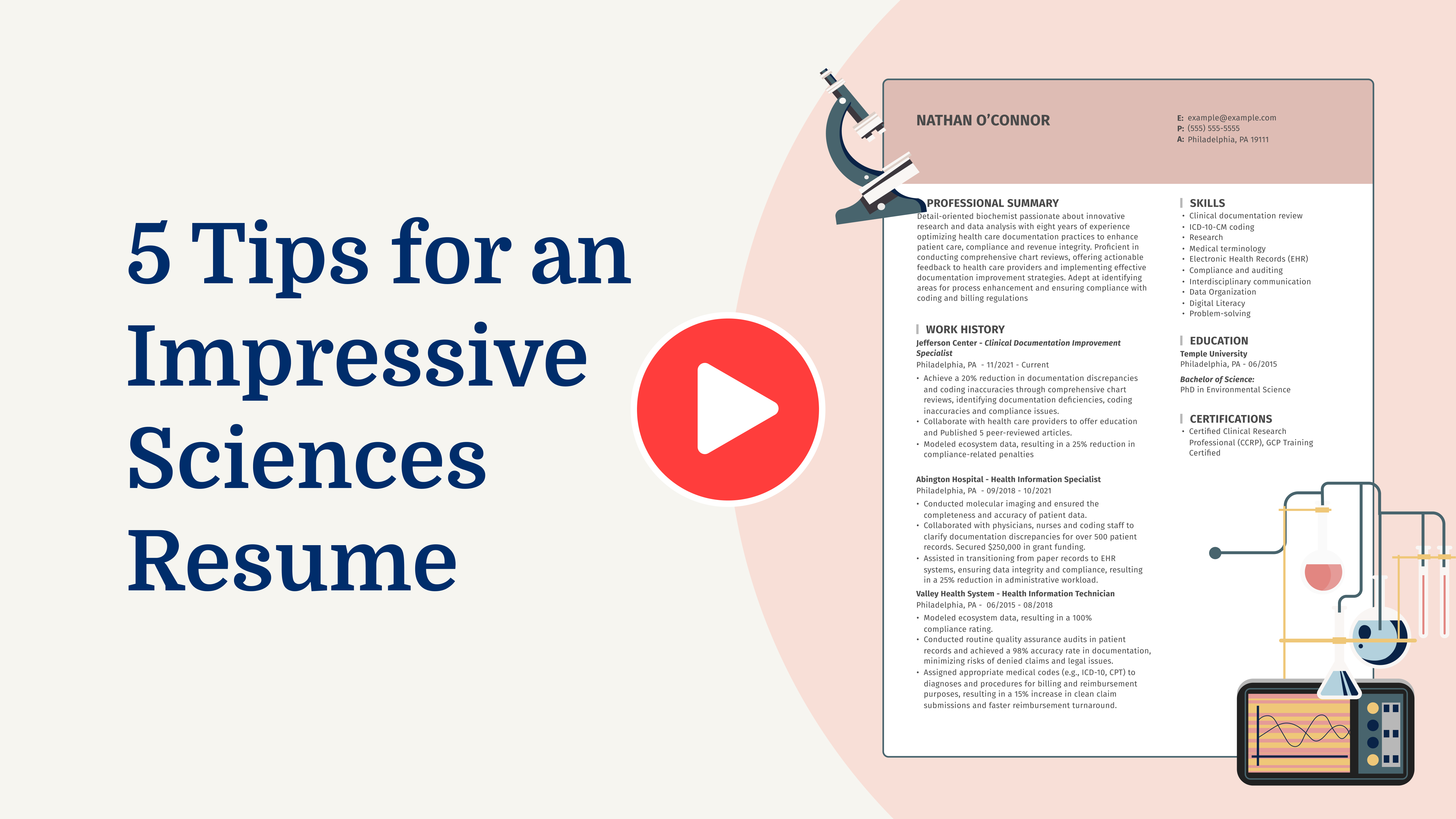
Highlight relevant technical skills
A geologist’s technical skills are essential for analyzing earth materials, conducting fieldwork, and interpreting geological data. To emphasize these abilities, create a dedicated technical skills section or weave them into your work experience descriptions.
This helps hiring managers quickly identify relevant expertise that sets you apart from other job seekers. Be specific when listing tools, software, and techniques used in geology to show practical knowledge rather than general statements.
Common technical skills for a geologist include geological mapping, sediment analysis, mineral identification, and core sampling. Skill in using GIS software like ArcGIS or QGIS is often required for spatial data interpretation tasks.
Highlight familiarity with modeling programs such as RockWorks or PetraSim for subsurface analysis and simulation tasks. Include knowledge of geophysical equipment like ground-penetrating radar or seismographs if relevant to your experience.
If integrating skills into the work experience section of your resume, describe how you applied them to achieve results effectively. For example, mention using GIS to map fault lines during an exploration project or conducting lab tests to determine rock properties for engineering purposes. This approach provides context while showcasing your ability to apply these tools effectively in real-world scenarios.
Example of a technical skills section
- Geographic information systems (GIS) software (ArcGIS, QGIS)
- Remote sensing techniques
- Mineral identification and analysis
- Geostatistical analysis
- Field mapping and surveying tools
- Core logging and sampling methods
- Petrology and petrography
- Hydrogeology modeling software (MODFLOW)
- Environmental impact assessment
- Seismic interpretation tools
Technical skills are important, but employers love seeing soft skills like teamwork, communication, and adaptability. Use our Resume Builder to make sure to show these in your resume to get noticed.
Quantify your accomplishments
Quantifying accomplishments in a resume makes it stand out by showing real impact rather than just listing duties. For a geologist, this means highlighting achievements such as discovering new mineral deposits or improving data collection methods.
By including measurable results like percentages, cost savings, or time efficiencies, you give employers a clear picture of your contributions. This approach is more engaging because it demonstrates how your work made a difference.
In the work experience section, each entry should start with your job title, employer name, location, and employment dates. Then focus on turning responsibilities into achievements using action verbs and metrics.
For example, instead of saying “conducted surveys,” say “increased survey accuracy by 20% through advanced techniques.” This shows not just what you did but how effectively you did it. Using numbers helps hiring managers quickly understand your skills and impact.
A results-driven resume is powerful because it helps hiring managers see the value you bring to their team. Quantified accomplishments make it easier for them to assess your potential contribution compared to other applicants. As a geologist, showcasing these results can highlight your expertise in exploring earth materials and solving complex problems efficiently, making you a strong applicant for the role.
5 geologist work history bullet points
- Conducted geological surveys in diverse terrains, increasing data accuracy by 25% for resource mapping projects.
- Used advanced geophysical techniques to identify potential drilling sites, improving exploration success rates by 40%.
- Managed a team of 4 junior geologists, improving project completion timeframes by 15% through effective mentorship and leadership.
- Implemented sustainable mining practices that reduced environmental impact by 30%, aligning operations with regulatory standards.
- Analyzed rock samples using laboratory technology, contributing to a 20% improvement in mineral identification processes.
Looking for resume ideas? Use our professional resume examples to find styles that make your skills shine.
Write a powerful professional summary
A professional summary on a resume acts as a brief introduction for hiring managers, helping them quickly understand who you are.
A professional summary is a short section that highlights your experience, skills, and key achievements in three to four sentences. It is best suited for experienced applicants, like seasoned geologists, who wish to showcase their professional identity and the value they bring to potential employers. This part of the resume emphasizes what you’ve accomplished in your career so far.
In contrast, resume objectives focus on career goals and are ideal for entry-level job seekers, career changers, or those with gaps in their employment history. They express what you aim to contribute rather than past accomplishments—think “what I’ve accomplished” vs. “what I aim to achieve.”
Next, we’ll provide examples of both summaries and objectives tailored for different industries and levels of experience to help guide you in crafting your own compelling introduction.
Geologist resume summary examples
Entry-level
Recent geology graduate with a Bachelor of Science in geology eager to apply academic knowledge and fieldwork experience. Completed internships focusing on sediment analysis and mineral identification. Skilled in using GIS software and conducting field surveys. Passionate about contributing to environmental geology projects and resource management.
Mid-career
Geologist with over seven years of experience in the oil and gas industry, specializing in reservoir characterization and seismic interpretation. Proven track record of collaborating on multi-million dollar exploration projects and improving drilling strategies through detailed subsurface modeling. Strong skills in data analysis, team collaboration, and project management.
Experienced
Senior geologist with extensive experience in mineral exploration and geological consulting. Expertise in structural geology, geostatistics, and resource estimation. Led diverse teams on international mining projects resulting in significant resource discoveries. Committed to sustainable practices and advancing geological research methodologies.
Geologist resume objective examples
Recent graduate
Enthusiastic recent graduate with a Bachelor of Science in geology seeking an entry-level geologist position to apply academic knowledge and fieldwork experience. Eager to contribute to environmental conservation projects and resource management while continuing to develop skills in geological mapping and analysis.
Career changer
Dedicated professional transitioning into the field of geology, leveraging a strong background in data analysis and research. Looking to bring analytical skills and a passion for earth sciences to a collaborative team focused on sustainable resource exploration and geological studies.
Specialized training
Entry-level geologist with specialized coursework in hydrogeology and GIS technology, eager to join an innovative team committed to groundwater management and environmental protection. Passionate about applying technical skills in geospatial analysis to support ecological initiatives.
Choose a resume template that’s neat and simple. Use clear headings and avoid fancy fonts or too many design elements, so it’s easy to read and looks professional.
Showcase your credentials
For a geologist, listing certifications, licenses, and specialized training is very important. These credentials show that you have the skills needed for the job. In technical fields like geology, employers look for proof that you know what you’re doing.
Having a dedicated certifications section on your resume helps make these stand out. This can work well with your education section to give a complete picture of your background.
- Professional Geologist (PG) License
- Certified Professional Geologist (CPG)
- Registered Geologist (RG)
- Geotechnical Engineer Certification
- Hydrogeology Certification
Listing these certifications shows that you are serious about your career as a geologist and have the right qualifications. They can make your resume more attractive to employers who need skilled workers in this field. By showcasing them clearly on your resume, you help ensure that potential employers see how qualified you are.
Example of a certifications section
Certified Professional Geologist (CPG)
Issued by: American Institute of Professional Geologists (AIPG)
Issued 2022
Geographic Information Systems Professional (GISP)
Issued by: GIS Certification Institute (GISCI)
Expires 2025
Hazardous Waste Operations and Emergency Response Standard (HAZWOPER) Certification
Issued by: Occupational Safety and Health Administration (OSHA)
Issued 2023
Well Control Certification
Issued by: International Association of Drilling Contractors (IADC)
Expires 2026
Fundamentals of Geology (FG) Exam
Issued by: National Association of State Boards of Geology (ASBOG)
Issued 2021
Use our ATS Resume Checker to quickly spot formatting and content errors and improve your resume.
FAQ
Do I need to include a cover letter with my geologist resume?
Including a cover letter with your geologist resume can improve your application and attract attention from potential employers.
A cover letter allows you to highlight your passion for geology, discuss specific projects you’ve worked on, and explain why you’re interested in the particular role or company.
For instance, if a company is involved in mineral exploration or environmental consulting, you can use this opportunity to share relevant experiences or express enthusiasm for those areas.
Consider using a Cover Letter Generator to craft a tailored cover letter that aligns with your resume and showcases your strengths as a geologist.
Additionally, reviewing cover letter examples can provide inspiration and help you create an effective document that resonates with hiring managers in the geology field.
How long should a geologist’s resume be?
For a geologist, the length of your resume typically depends on your experience level and the complexity of your projects.
Early in your career, a concise one-page resume is generally sufficient to highlight your education, fieldwork, and any relevant internships or entry-level positions.
As you gain more experience with specialized research or extensive project management roles, transitioning to a two-page resume can be beneficial. This allows you to detail significant contributions and advanced skills without overcrowding the document.
Explore our guide on how long a resume should be for examples and tips tailored to different stages in a geologist’s career.
How do you write a geologist resume with no experience?
Crafting a resume with no experience as a geologist is challenging. Focus on highlighting your education and relevant skills to create a strong document. Consider these helpful tips for guidance:
- Highlight your academic background: Start with your geology degree details, including the university name, graduation date, and any honors or relevant coursework that aligns with geology specialties.
- Focus on fieldwork and projects: Mention any geological field trips, lab work, or research projects undertaken during your studies. Describe what you learned or contributed in these experiences as they relate to practical geologist skills.
- Emphasize transferable skills: Geologists often use analytical and problem-solving abilities. If you’ve developed these through other activities like volunteer work or part-time jobs, such as data analysis or environmental awareness initiatives, include them prominently.
Rate this article
Geologist
Share this page
Additional Resources

The Illusion of Wage Growth: Where Paychecks Stretch the Farthest
U.S. wages have climbed at one of the fastest rates in modern history. Between 2020 and 2024, the average American worker’s pay rose from about $64,000 to $75,600, an 18%
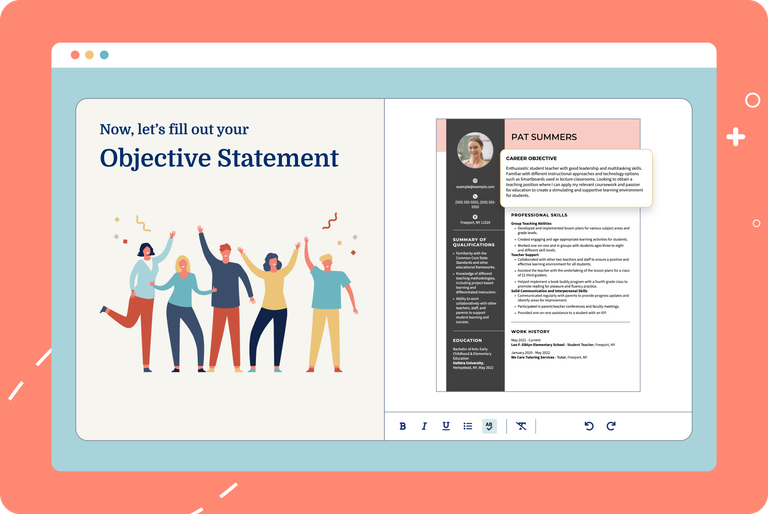
100+ Resume Objective Statement Examples & Best Practices
In just a sentence or two, a resume objective statement tells hiring managers the role or career path you’re aiming for and the unique skills and value you bring to

150+ Skills for a Resume: Examples for Any Job
Crafting a standout resume starts with highlighting the skills and qualifications that demonstrate your fit for the role. But in a crowded job market, knowing which abilities will actually catch
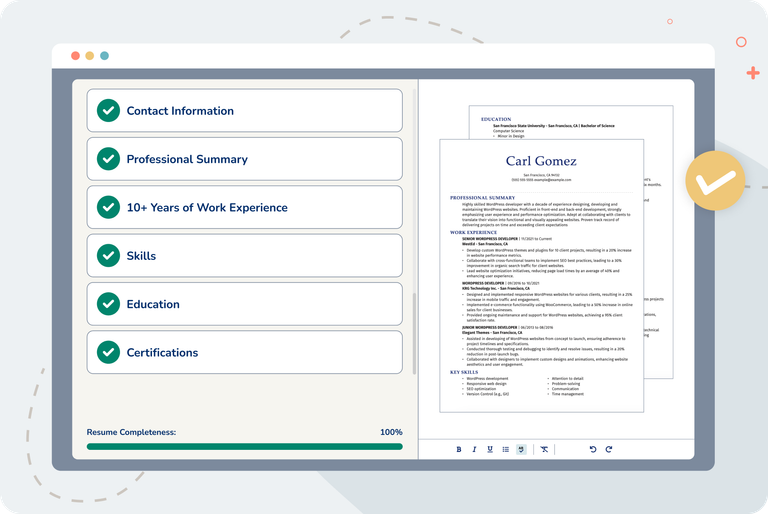
When to Use a Two Page Resume (With Examples & Formatting Tips)
If you’ve spent years building your skills, growing in your career, and racking up accomplishments, a one-page resume might not cut it. A two-page resume gives you space to present a
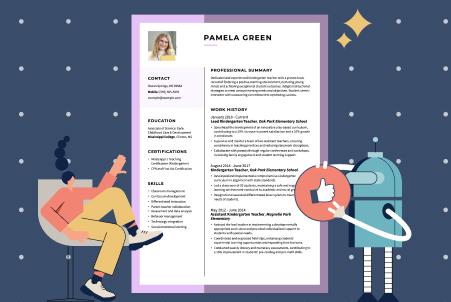
How to Make an ATS Friendly Resume (Templates & Guide)
In today’s fast-paced hiring climate, many employers use applicant tracking systems (ATS) to organize, store, and screen candidate information. Optimizing your resume for ATS is essential for ensuring your application passes
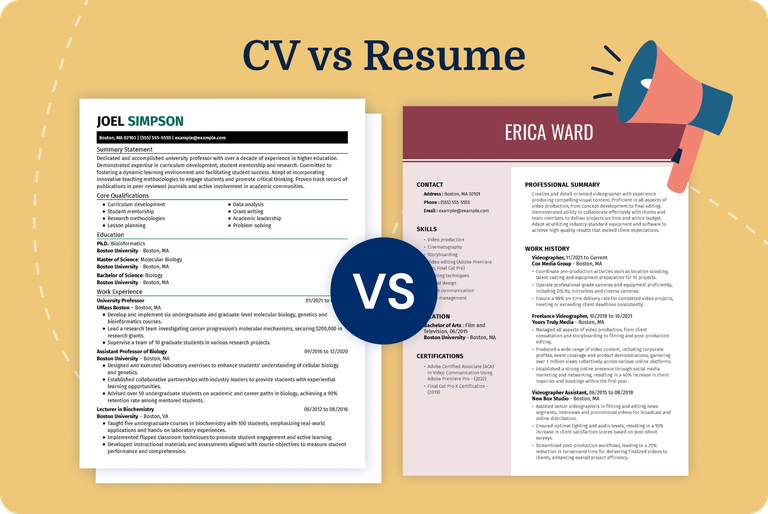
CV vs Resume: What’s The Difference?
Confused about the difference between a resume and a CV? You’re not alone! While both documents help you land a job, they vary in content, structure, and formatting. In this guide, we’ll
